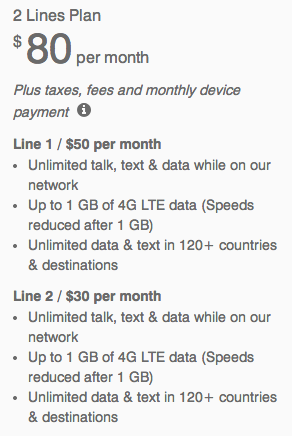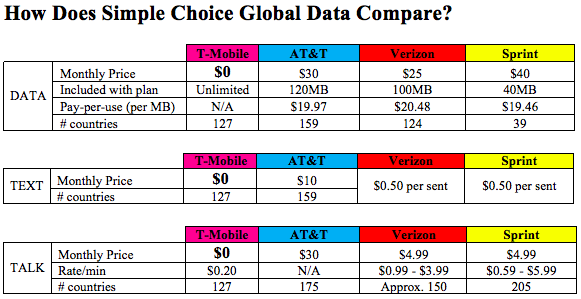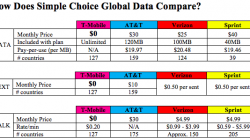If there’s one thing I hate most about traveling outside the U.S., it’s trying to use my cell phone. I carry a $700 miniature computer in my pocket more powerful than some desktops, and yet the $170 a month my wife and I shell out every month to Verizon Wireless doesn’t include the occasional call or email when we’re in Paris or Bangkok. That means I can’t call my wife, text my friends, or tweet to you guys when I’ve got a monkey crawling on my head!
I find this especially infuriating because I am not a heavy user of my phone for calls or data. I didn’t even have a cell phone until 2004, and I signed up for text messaging last year only because it was finally included for free. (Before then, I blocked text message on my phone to avoid paying for incoming messages.) I’ve long objected on principle to the outrageous fees that most carriers charge for incremental improvements on existing infrastructure.

Not only is T-Mobile cheaper, but it’s easy to use. You don’t have to tell anyone you’re leaving the country. Just get up and go. When I told Verizon I was going to Southeast Asia for my honeymoon, I bit the bullet and decided to pay for their international data coverage. $25 a month — paid two months in advance — got me 100 MB of data and a discounted rate on calls. Despite the assurances of the employee over the phone that it would hop from country to country, I was only ever able to use it successfully in the Seoul-Incheon airport where, ironically, I had access to free WiFi. The Verizon agent never told me Indonesia was excluded from their data agreement, nor did I receive a satisfactory explanation for the poor coverage in Thailand and Hong Kong.

Part of the reason I’m writing this post now is that T-Mobile gave me some figures from a recent survey showing 88% of surveyed Americans reported similar frustrations. Roughly 20% leave their phones at home, 40% turn off their data roaming, and another 20% would turn off their roaming if they knew how.
I do carry my phone with me in case of emergencies, but I don’t think I’ve ever made a call using it overseas because the potential cost is so worrisome. I had a $70+ surcharge on my Verizon bill waiting for me when I got back from my honeymoon, which was like salt in the wound after such a horrible experience trying to use what I paid for.
I’m not sure I’m ready to make the switch to T-Mobile just yet. I use Verizon now partly because my former AT&T coverage was so bad when I moved to Seattle from Orange County. It’s not worth it to me to lose coverage during the 11 months I’m at home just so I can save money during a few vacations. Megan would argue it’s probably a good thing if I’m not using my phone.
But T-Mobile knows this is an issue and has, I think, wisely been using the proceeds from its $3 billion breakup fee following its failed merger with AT&T to build its own 4G LTE network. Some company reps I spoke with suggested it is one of the fastest in the country. They aren’t exactly unbiased, but with a windfall like that it seems a good strategy to resolve past shortcomings.
Not only have they built a better network with this money, they will even pay you to move your business, covering the cost of your early termination fee if you have an existing contract with AT&T, Verizon Wireless, or Sprint ($300 device trade-in credit and up to $350 in reimbursement for early termination fees). And better yet, there are no contracts with T-Mobile. One justification for contracts is that the carrier pays for the device and seeks to earn back that money through inflated service fees. You can choose to buy an unlocked phone, or T-Mobile will add a separate monthly fee to your bill until you pay it off — and stop collecting the fee when you do. I’ve yet to see Verizon or AT&T lower my bill when I reach the end of a two-year contract.
One of the interesting things T-Mobile observed when it introduced these offers was that very few people took advantage of their included international service during the first few months. They were so used to turning off their phones or leaving them at home that they had to shrug off the habit. But since then the growth has been staggering. I was told monthly data and texting consumption by T-Mobile’s customers abroad has been doubling every month.
All-in-all there are several encouraging reasons to move to T-Mobile. I’m a cautious guy, and most of my travel is domestic. I’m not exactly chomping at the bit to move. But I do like what I see, and I think offers like these may be some of the reason AT&T and Verizon are now including more services in their own plans. The old goliaths move slowly, and I think T-Mobile will probably remain the only reasonable alternative for some time to come.
Update: One reader commented that I should say something about data speeds internationally, as he thought it was slow due to relying on older 2G EDGE technology. My opinion is that slow is better than expensive or non-existing, which were both the case when I tried to pay Verizon to use my phone abroad. PC World has a review and calls it “not bad for free.” Also, because T-Mobile doesn’t lock you into a contract you still have the option to swap in a local SIM card on an unlocked device when you travel — something you can’t do with the subsidized phones from other carriers.





